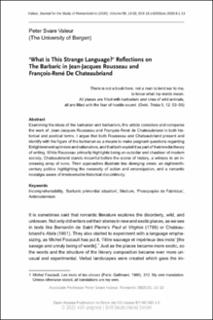'What is this strange language?' Reflections on the Barbaric in Jean-Jacques Rousseau and François-René de Chateaubriand
Journal article, Peer reviewed
Published version

Åpne
Permanent lenke
https://hdl.handle.net/11250/2834039Utgivelsesdato
2020Metadata
Vis full innførselSamlinger
Originalversjon
Romantik: Journal for the Study of Romanticisms. 2021, 9 (1), 13-22. 10.14220/jsor.2020.9.1.13Sammendrag
Examining the ideas of the barbarian and barbarism, this article considers and compares the work of Jean-Jacques Rousseau and François-René de Chateaubriand in both historical and poetical terms. I argue that both Rousseau and Chateaubriand present and identify with the figure of the barbarian as a means to make poignant questions regarding Enlightenment optimism and rationalism, and that both exploit it as part of their media theory of writing. While Rousseau primarily highlights being an outsider and chastiser of modern society, Chateaubriand stands mournful before the scene of history, a witness to an increasing array of ruins. Their approaches illustrate two diverging views: an eighteenthcentury politics highlighting the necessity of action and emancipation, and a romantic nostalgia aware of irredeemable historical discontinuity.
